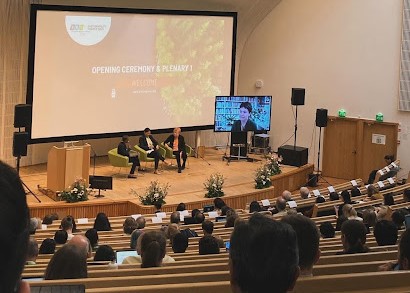By Olivia St-Laurent, MSc student at McGill University
As I approached the completion of an MSc in Renewable Resources at McGill University, I traveled to Europe to attend a congress in Helsinki, Finland, and to present my work at an academic conference in Oslo, Norway. With the help of an excellence award granted by the QCBS, I had the opportunity to jet off to Scandinavia and experience long summer days and long summer nights under a sky that remained bright for 18 hours every day.
Part 1
My Scandinavian experience kicked off with the Sustainability Research & Innovation (SRI) Congress in Helsinki, Finland, which gathered scientists, policy makers, executives, artists, and innovators. The common thread linking together such a diverse array of voices and perspectives? The desire to discover, create, and learn about sustainability solutions for designing a good life.
A recurring question seemed to hopscotch from one conversation to another. I first heard it in a plenary session, then during an interactive roundtable discussion and again, as I eavesdropped on an informal conversation during one of (many, many) coffee breaks: What constitutes a good life?
While most of us attending the conference have in one way or another dedicated ourselves to creating a more liveable, equitable, and sustainable planet, there are differences in what we aspire to achieve, in how we envision a better future where life for people and nature is, well, good. This seemingly simple question sparked dynamic, captivating exchanges throughout the five days of the congress.
In one particularly moving plenary, called “Living on the Frontlines of Change” in partnership with the Global Indigenous Youth Summit on Climate Change (GIYSCC), we heard personal anecdotes on living the impacts of climate change, presented in speakers’ native languages and translated for the audience. This was a welcome reminder of the vast differences that exist in how people experience the present, and what they aspire to achieve in the future.

On Helsinki Day (June 12th is the city’s birthday), the annual “Dinner under the Sky” invited conference participants to dine at the same table as city dwellers, fellow researchers, and even the mayor of Helsinki. Here, there is no pretense; young high schoolers dine and engage in friendly debate with the city’s climate director over non-alcoholic beers, as if this were all perfectly normal. I loved it. I enjoyed a hearty vegan meal with the splendid company of strangers, and was invited to share my feelings about fostering societal trust and cooperation to tackle the growing dangers of climate change and biodiversity loss.
Next, a half-day discussion forum on sustainable cities hosted by the City of Helsinki invited attendees to workshop solutions for keeping the world’s cities within planetary boundaries. The workshop was preceded by a panel discussion about the city’s efforts, and the challenges it faces, in the fight against climate change. This event highlighted the complexities of adapting one city’s successful innovations to fit with the realities of other places, other communities, and other governance contexts. It emphasized the importance of breaking down silos, between cities and between nations, to foster collective learning and share lessons learned about experiments in urban sustainability and resilience.
While the challenges we face are ever-growing, I felt inspired by the stories, poems, and insightful think-pieces of scholars from around the world telling what brings them hope. This casual yet incredibly touching gathering took place at Puistokatu 4, an innovative project and curated space dedicated to fostering new encounters, community, and collaborative action with a mission to craft a good life within planetary boundaries.

Although my visit to beautiful Helsinki was hampered by a stubborn cold and untimely coughing fits, I simply could not say goodbye without having experienced a visit to a public sauna, and a (very cold and energizing) swim in the Baltic Sea!

Part 2
Next, I flew to Oslo, Norway for the 14th International Sustainability Transitions (IST) conference, which began with a welcome day for early career researchers. Little did I know how special and supportive the ‘conference buddies’ I met on this first day would become. Again and again, we conference buddies bumped into each other, either to share a quick lunch, to cheer each other on before a presentation, to decide on outfits for the evening’s networking cocktail, to brainstorm on the sorry state of the world, or to find comfort and feel optimism in one another’s dedication to crafting a better tomorrow.
My presentation was scheduled at 9am the morning after the conference party. I half expected to find myself standing alone at the front of the seminar room, facing audience members that were either sleep-deprived or hungover (or both), nervously speeding through my ten minute slideshow, only to have a series of difficult questions fired at me by my discussant (who I was sure had had a restful night’s sleep), and walk away feeling like an imposter. In reality, I stood facing a full room of smiling conference buddies (and other faces I recognized from the last few days). I confidently delivered my presentation, enthusiastically sharing the results of a case study in which I examined the impacts of local government policy on the sustainability transformation of a borough located in the far east of Montreal. The animated audience generously complimented my presentation, asked interesting questions, and offered constructive feedback that improved the final draft of a paper I was preparing for publication.
While I eventually grew tired of the generic lecture-style sessions (especially the speed talks, which always left me wanting more), I grasped the value of an academic conference for gathering a global community of researchers sharing interests and objectives, sparking new partnerships, and transferring knowledge and nuggets of insight between senior scholars and up-and-coming young scientists.
On my last day in Oslo, I visited a public sauna floating on the sea, built using recovered and upcycled materials, with my Spanish and Australian conference buddies. Together, we recounted each day of the conference, sharing stories and adding new pieces to the collective memory of a great experience.

About the author: Olivia St-Laurent is an MSc candidate at McGill University co-supervised by Dr. Elena Bennett (department of Natural Resource Sciences at McGill University) and Dr. Karina Benessaiah (based at the University of Guelph in Ontario). Olivia is driven by hopeful visions of a better future in which people and nature thrive, and is passionately committed to advancing sustainability through research and tangible action. Currently, she studies transformations in cities towards greater social and ecological sustainability.

0 Comments